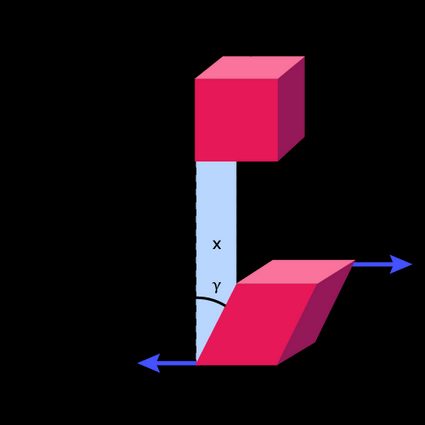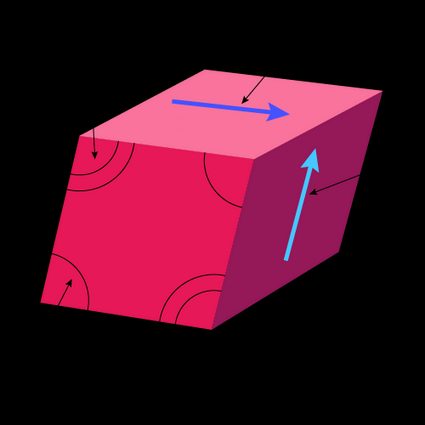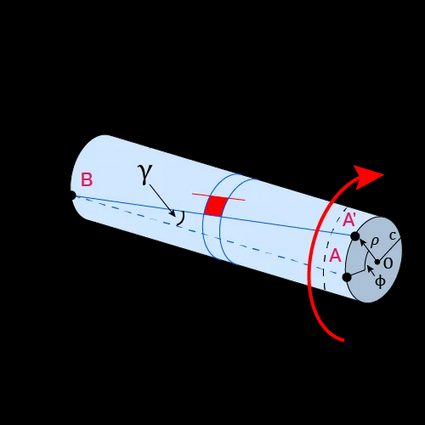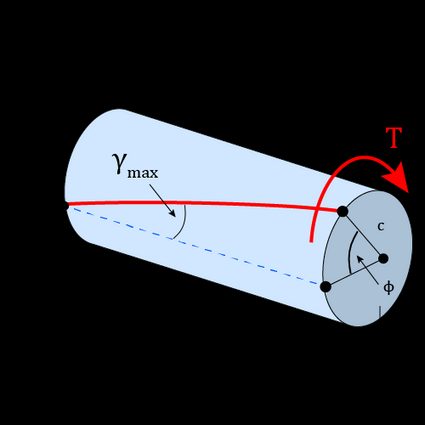Shear Strain Calculator
This shear strain calculator finds the strain due to shearing stresses in different situations (shear force or torque).
Shear stresses act in almost every mechanical situation, and the strain energy of these shear stresses is a powerful tool for solving deflection problems using energy methods. For this reason, it's essential to be aware of shear strain and the equations behind it.
If you're interested in knowing where things come from, in the following sections, we present the shear strain equations behind this calculator and the max shear strain formula for a shaft under torsion.
Shear strain definition
Suppose you apply two tangent forces on the opposite faces of a cubic or rectangular element. If that occurs, one of the faces will displace a distance relative to the other.

The shear strain is no more than the angle (shown in the image) caused by the displacement . In practice, displacement is much smaller than , and is a small angle.
How to calculate shear strain
Depending on the situation and the information available, you'll need a different equation to calculate the shear strain.
Cubic object with known displacement
If we know the displacement , we can calculate the shear strain with the following formula:
, where:
- — Shear strain;
- — Displacement due to shear stress caused by forces ; and
- — Transverse dimension of the element, as shown in the previous image.
Strictly speaking, is not the shear strain () but the tangent of the shear strain. Even so, we can say and () are practically the same, as for small angles,
Element with known shear modulus subjected to shear stress
We usually don't know the displacement due to shear stress, and when that occurs, we can calculate the shear strain this way:
, where:
- — Shear stress applied to the element; and
- — Shear modulus, also known as modulus of rigidity, of the material.

Contrary to the previous case, this formula provides the angle instead of its tangent.
💡 This equation is a version of Hooke's law expressed in terms of shear stress and strain. You can use our shear stress calculator to obtain the shear stress under different situations.
🔎 Besides Poisson's ratio and the Elastic modulus, these three constants help to form the group of equations representing the general form of Hooke's law for homogenous isotropic materials.
Circular shaft subjected to torsion
When we apply a torque to a circular shaft, every element parallel and perpendicular to the shaft axis suffers shear strain. We can calculate this shear strain with the formula:
where:
- — Distance from the axis to the point at which we want to know the shear strain;
- — Angle of twist of the transverse section (obtain it with the angle of twist calculator); and
- — Length of the shaft.

Max shear strain formula for a shaft under torsion
As you can note from the previous formula, a greater implies a higher strain. At the shaft surface, where equals the shaft radius (), the shear strain is maximum:

What is the unit of shear strain?
The shear strain unit is radian, a dimensionless unit. For this reason, the shear strain unit is often omitted. Besides, the normal strain unit is also radians or dimensionless.
How to calculate shear strain?
To calculate the shear strain γ, divide the shear stress 𝜏 by the shear modulus G. For example, in a brass element (G = 3.5×10¹⁰ Pa) subjected to a shear stress of 𝜏 = 8.0×10⁶ Pa, shear strain equals γ = (8.0×10⁶ Pa)/(3.5×10¹⁰ Pa) = 2.3×10⁻⁴.
That's how to calculate shear strain! You can also use our shear strain calculator.
Which is the shear strain symbol?
The shear strain symbol is the Greek letter γ, gamma. Depending on the direction and plane of actuation of the stress, γ can have different subscripts:
- The shear strain symbol γxy represents the strain in the XY plane caused by the shearing stresses 𝜏xy and 𝜏yx.
- γyz represents the same in the YZ plane, caused by 𝜏yz and 𝜏zy, the stresses in that plane.
- γzx represents the same in the ZX plane, caused by the 𝜏yz and 𝜏zy stresses.
How to calculate the modulus of rigidity in a torsion test?
To calculate the modulus of rigidity G in a torsion test:
- Organize the list of angles of twist (in radians) corresponding to each torque applied.
- Plot each torque (vertical axis) against its corresponding angle (horizontal axis).
- Get the slope of the part of the graph that follows a linear relationship.
- As torque T and angle of twist ϕ relate each other linearly by the equation: T = (JG/L)ϕ, to get G, equal the slope of the graph to JG/L, and solve for G. The result would be G = slope × L/J.
How to calculate the strain energy of shear stress?
-
To calculate the strain energy density for a material under plane shearing stress, use the equation u = 𝜏²/(2G), where:
- 𝜏 — Shear stress applied to the material;
- G — Shear modulus of the material; and
- u — Strain energy density (energy per unit volume).
-
To calculate the total strain energy of shear stress U, integrate the strain energy density through the entire volume V:
U = ∫[𝜏²/(2G)] dV